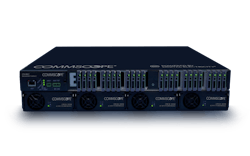CommScope’s Constellation delivers 1000 Watts of power over 500 meters, along with 10G bandwidth
CommScope launched its Systimax Constellation platform, an edge-based system that the company says is ideal “for connecting and powering tomorrow’s hyperconnected enterprise.” Constellation combines fault-managed power, hybrid power/data fiber, and ceiling-based Constellation Points in a star topology, to connect network devices and systems.
“Compared to traditional structured cabling networks, the Constellation platform utilizes a radically simplified architecture that is both modular and technology-agnostic,” the company said when launching the system August 10. “This allows it to use fewer components while supporting both converged and segmented networks, AC and DC power applications, and a variety of connectivity standards. As a result, the Constellation platform delivers greater power and faster speeds to more devices, requiring less space and lowering the overall carbon footprint of the network. It is an unparalleled solution for quickly and efficiently deploying the next generation of enterprise edge networks.”
Constellation leverages fault-managed power, which CommScope points out safely transmits more power over less copper wire than traditional powering technologies. “That approach, deployed in a star network topology, extends service distances from equipment rooms and delivers 10G speeds and 1kW power to a growing number of connected devices in increasingly dense urban environments.”
The distributed star topology extends services from equipment rooms to a service area or zone to support nearby devices. This simplified architecture “can significantly reduce the copper and plastic in the network—in some cases by nearly 60%--and the typical installation can reduce labor hours by more than 50% compared to traditional systems,” the company added.
CommScope provided the following “by-the-numbers” description of what Constellation delivers.
- 1000W power supply across 110V AC, 48V DC and 24V DC systems as well as PoE
- 500M effective transmission distance between equipment room and convergence points
- 10G bandwidth capabilities
- 57% reduction in skilled labor hours required to install
- 50 devices supported per Constellation convergence point
Jack Carlson, senior vice president of CommScope’s cable and connectivity solutions’ enterprise business unit, commented, “The Constellation platform addresses our customers’ growing need to build and augment IP networks in response to the densification of urban centers and the proliferation of connected devices. By approaching this challenge with a modular, technology-agnostic solution, we’re providing our customers with more choices for building connectivity and power into the network edge—and helping them do it in a way that’s cost-effective, scalable and sustainable.”
In June, we at Cabling Installation & Maintenance hosted a webinar delivered by CommScope’s Ronna Davis, during which she described the technology, economic, and societal forces that accentuate the value of a platform like Constellation. When promoting that webinar, we observed, “The enterprise network has evolved from a predictable physical configuration of multiple-data-drops-per-workstation, where connections were made inches above the floor, to a dynamic and often unconventional configuration in which many connections are made at the ceiling. And those connections typically require a supply of power as well as the transmission of data. Networks designed for yesterday’s office buildings may not meet the demands of today’s enterprise, and any network being designed today must provide the flexibility to accommodate future requirements while delighting current users. Accomplishing this commitment to current and future needs requires the evolution of technologies and of network-design techniques. This webcast seminar … explores this evolution while providing practical how-to information for network planners, installers, and owners. The seminar describes the user needs and information-consumption habits that have resulted in network devices demanding high power levels as well as high-speed data throughput. It outlines technologies, products, and systems that have been developed to meet these dual needs. The seminar also discusses the advantages of using a distributed star topology, as opposed to a basic star topology, to build a network that is efficient on several levels.”
About the Author
Patrick McLaughlin
Chief Editor
Patrick McLaughlin, chief editor of Cabling Installation & Maintenance, has covered the cabling industry for more than 20 years. He has authored hundreds of articles on technical and business topics related to the specification, design, installation, and management of information communications technology systems. McLaughlin has presented at live in-person and online events, and he has spearheaded cablinginstall.com's webcast seminar programs for 15 years.

